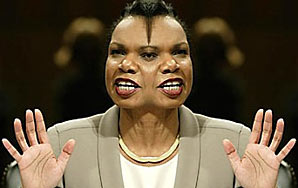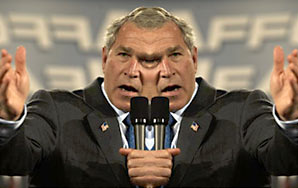 |
 |
 |
 Editorials | February 2005 Editorials | February 2005  
What They Really Mean...
 Norman Solomon - t r u t h o u t Norman Solomon - t r u t h o u t


Since the 1950s, many young Americans have first encountered critiques of mass media in the pages of Mad. With its intricate cartoons and satirical sendups, the monthly magazine gained a reputation for skewering politicians, advertisers, TV shows and a variety of print outlets.

One of Mad's recurrent shticks has involved making fun of gaps between words and meaning -- an especially welcome form of humor because mainstream news so often amplifies the words of public figures with scarcely a hint of irony, much less deprecation. Notwithstanding the zany image of Alfred E. Newman, the magazine's grinning icon of absurdity has overseen plenty of sobering antidotes to the phony self-importance of major media.

One-third of the way through February, looking at a few of the day's top news stories, I tried to imagine the properly Mad way to annotate them. Here's what I came up with:



Secretary of State Condoleezza Rice said to an audience at a university in Paris: "It is time to turn away from the disagreements of the past. It is time to open a new chapter in our relationship and a new chapter in our alliance."

What she actually meant: "Stop complaining! We pulled off the invasion of Iraq, our troops are staying, and there's nothing you wimpy French people can do to stop us, so get over it already!"

Rice said: "America stands ready to work with Europe on our common agenda, and Europe must stand ready to work with America."

What she meant: "Don't forget how France and Germany lost out on Iraqi oil deals and other booty after the invasion. Uncle Sam has plenty of big trains leaving stations all over the world. You want to ride or eat our dust?" |  | 

President George W. Bush said in a statement about the promotion of his favorite political strategist to deputy chief of staff at the White House: "Karl Rove is a longtime adviser and trusted member of my team. His hard work and dedication have been invaluable."

What he meant: "If it wasn't for Karl, I'd never have been a governor, let alone president. This guy is so smart and mean he makes Lee Atwater and Roger Ailes seem like dumb saints. I haven't had this much fun since I was a kid blowing up frogs with firecrackers."

Bush said: "I appreciate Karl's willingness to continue to serve my administration in this new position."

What Bush meant: "I owe Karl big time. Thanks to him, my opportunism has triumphed with my administration's policies. No way do I want to lose him."

President Bush marked Black History Month by welcoming some African-American leaders to the East Room of the White House.

He declared: "Success of freedom on the home front is critical to its success in foreign lands. As I said in my inaugural address, we cannot carry the message of freedom and the baggage of bigotry at the same time."

What he meant: "Republicans need a better image on racial issues. If we can make our percentage of the black vote a little less pitiful, we'll have a better chance of keeping the Democrats out of power in Washington."

Bush said: "Americans were still barred by law from hotels and restaurants, made to drink from separate water fountains, forced to sit in the back of a bus -- all because of the color of their skin. We need to teach them about the heroes of the civil rights movement, who by their courage and dignity forced America to confront the central defect of our founding."

What he meant: "Back in the '50s and '60s, a lot of the mentors of the right-wing politicians I'm now tight with were fighting against desegregation and vilifying the civil rights movement as a sinister force for judicial activism that threatened to undermine the sacred covenant of states' rights. Well, times have changed. Fortunately, the old power base of the Dixiecrats in Congress has been transformed into the country's most solid bedrock of Republican power. Blacks can use those water fountains, but we'll keep slashing social programs and skewing the tax structures so my rich pals can get richer while lots of people will stay near the bottom of the economic ladder. And I'm not just whistling Dixie." |
| 
 | |
 |



